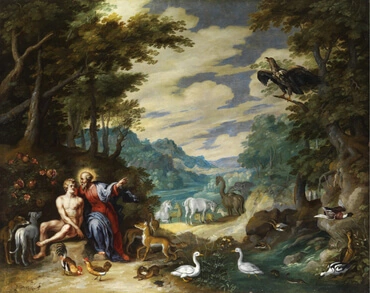1
Men ormen var listigare än alla andra markens djur som HERREN Gud hade gjort; och han sade till kvinnan: »Skulle då Gud hava sagt: 'I skolen icke äta av något träd i lustgården'?»
2
Kvinnan svarade ormen: »Vi få äta av frukten på de andra träden i lustgården,
3
men om frukten på det träd som står mitt i lustgården har Gud sagt: 'I skolen icke äta därav, ej heller komma därvid, på det att I icke mån dö.'»
4
Då sade ormen till kvinnan: »Ingalunda skolen I dö;
5
men Gud vet, att när I äten därav, skola edra ögon öppnas, så att I bliven såsom Gud och förstån vad gott och ont är.»
6
Och kvinnan såg att trädet var gott att äta av, och att det var en lust för ögonen, och att det var ett ljuvligt träd, eftersom man därav fick förstånd, och hon tog av dess frukt och åt; och hon gav jämväl åt sin man, som var med henne, och han åt.
7
Då öppnades bådas ögon, och de blevo varse att de voro nakna; och de fäste ihop fikonlöv och bundo omkring sig.
8
Och de hörde HERREN Gud vandra i lustgården, när dagen begynte svalkas; då gömde sig mannen med sin hustru för HERREN Guds ansikte bland träden i lustgården.
9
Men HERREN Gud kallade på mannen och sade till honom: »Var är du?»
10
Han svarade: »Jag hörde dig i lustgården; då blev jag förskräckt, eftersom jag är naken; därför gömde jag mig.»
11
Då sade han: »Vem har låtit dig förstå att du är naken? Har du icke ätit av det träd som jag förbjöd dig att äta av?»
12
Mannen svarade: »Kvinnan som du har givit mig till att vara med mig, hon gav mig av trädet, så att jag åt.»
13
Då sade HERREN Gud till kvinnan: »Vad är det du har gjort!» Kvinnan svarade: »Ormen bedrog mig, så att jag åt.»
14
Då sade HERREN Gud till ormen: »Eftersom du har gjort detta, vare du förbannad bland alla djur, boskapsdjur och vilda djur. På din buk skall du gå, och stoft skall du äta i alla dina livsdagar.
15
Och jag skall sätta fiendskap mellan dig och kvinnan, och mellan din säd och hennes säd. Denna skall söndertrampa ditt huvud, och du skall stinga den i hälen.»
16
Och till kvinnan sade han: »Jag skall låta dig utstå mycken vedermöda, när du bliver havande; med smärta skall du föda dina barn. Men till din man skall din åtrå vara, och han skall råda över dig.»
17
Och till Adam sade han: »Eftersom du lyssnade till din hustrus ord och åt av det träd om vilket jag hade bjudit dig och sagt: 'Du skall icke äta därav', därför vare marken förbannad för din skull. Med vedermöda skall du nära dig av den i alla dina livsdagar;
18
törne och tistel skall den bära åt dig, men markens örter skola vara din föda.
19
I ditt anletes svett skall du äta ditt bröd, till dess du vänder åter till jorden; ty av den är du tagen. Ty du är stoft, och till stoft skall du åter varda.»
20
Och mannen gav sin hustru namnet Eva, ty hon blev en moder åt allt levande.
21
Och HERREN Gud gjorde åt Adam och hans hustru kläder av skinn och satte på dem.
22
Och HERREN Gud sade: »Se, mannen har blivit såsom en av oss, så att han förstår vad gott och ont är. Må han nu icke räcka ut sin hand och taga jämväl av livets träd och äta, och så leva evinnerligen.»
23
Och HERREN Gud förvisade honom ur Edens lustgård, för att han skulle bruka jorden, varav han var tagen.
24
Och han drev ut mannen, och satte öster om Edens lustgård keruberna jämte det ljungande svärdets lågor, för att bevaka vägen till livets träd.







